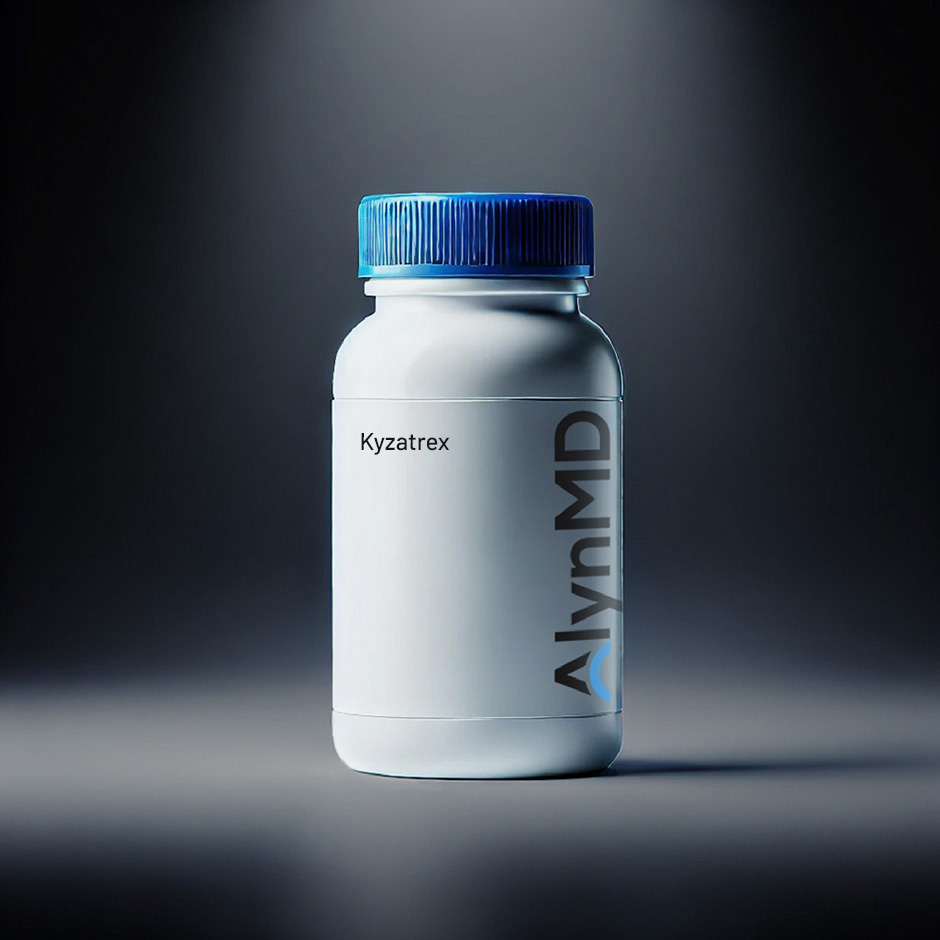1 Week
-
Increased energy levels
-
Slight improvement in mood or motivation
-
Initial changes in libido or sexual interest



Increased energy levels
Slight improvement in mood or motivation
Initial changes in libido or sexual interest
Noticeable improvements in mood and confidence
Enhanced physical stamina and reduced fatigue
Improved sexual performance and desire
Significant gains in muscle strength and endurance
Improved mental clarity and focus
More consistent mood stability and reduced irritability
Elevated blood pressure
Increased red blood cell count (hematocrit)
Mild headache or fatigue
Gastrointestinal discomfort or nausea
Fluid retention or swelling (feet or ankles)
Mood fluctuations or irritability
Blood clots (deep vein thrombosis or pulmonary embolism)
Significant worsening of prostate symptoms
Severe cardiovascular events (heart attack or stroke)
Liver abnormalities
Severe allergic reactions (rash, swelling, trouble breathing)
Kyzatrex offers a convenient oral option compared to injections or topical treatments. However, the choice of therapy should be based on individual needs, medical history, and a discussion with a healthcare provider.
Kyzatrex should be taken with food to enhance absorption. Follow your healthcare provider’s instructions regarding diet and medication timing.
If you miss a dose, take it as soon as you remember. If it’s close to your next scheduled dose, skip the missed dose and resume your regular schedule. Do not double up doses.
Testosterone replacement therapy, including Kyzatrex, can suppress sperm production, potentially affecting fertility. Discuss fertility concerns with your healthcare provider before starting treatment.
The safety and efficacy of Kyzatrex in men aged 65 and older have not been established. Older patients may be at increased risk for certain side effects.
Kyzatrex can interact with certain medications, including blood pressure drugs and blood thinners. It’s essential to inform your doctor about all medications and supplements you’re taking.
Some men may notice improvements in energy and mood within a few weeks, but it may take up to three months to experience the full benefits.
Kyzatrex is an oral testosterone replacement therapy, that is typically taken twice daily with food, as directed by your healthcare provider.
Men diagnosed with hypogonadism or clinically low testosterone levels due to certain medical conditions may benefit from Kyzatrex. It’s essential to consult a healthcare provider for proper evaluation.
Oral TRT offers a non-invasive alternative to injections or topical treatments, providing convenience and ease of use while effectively restoring testosterone levels.

Important Safety Information for Kyzatrex (Oral Testosterone Replacement Therapy)
Kyzatrex is an FDA-approved oral testosterone replacement therapy (TRT) prescribed for adult men diagnosed with hypogonadism due to specific medical conditions. As of February 2025, the FDA has removed the previous boxed warning related to cardiovascular risks for all testosterone products, including Kyzatrex.
Potential Risks and Warnings:
Increased Blood Pressure:
Kyzatrex may raise blood pressure, potentially increasing the risk of serious cardiovascular events such as heart attack or stroke. Ensure blood pressure is adequately controlled before starting therapy, and regularly monitor it throughout treatment.
Polycythemia (Elevated Red Blood Cell Count):
Treatment with Kyzatrex may elevate red blood cell counts, increasing the risk of blood clots. Regularly monitor hematocrit levels before and during therapy.
Prostate Health Risks:
Testosterone therapy can worsen symptoms of benign prostatic hyperplasia (BPH) and may increase the risk of prostate cancer. Regular prostate examinations and PSA monitoring are recommended before and during therapy.
Risk of Venous Thromboembolism (VTE):
Blood clots in veins, such as deep vein thrombosis (DVT) or pulmonary embolism (PE), have been reported with testosterone products, including Kyzatrex. Seek immediate medical attention if symptoms occur.
Potential for Abuse:
Testosterone, including Kyzatrex, is classified as a Schedule III controlled substance due to its potential for misuse and abuse. Misuse may result in serious cardiovascular and psychological side effects.
Contraindications:
Do not use Kyzatrex if you:
Have known or suspected prostate or breast cancer.
Are allergic to testosterone or any components in Kyzatrex.
Are pregnant, as testosterone may harm an unborn child.
Have low testosterone unrelated to a recognized medical condition, such as low testosterone due to aging alone.
Common Side Effects:
The most common side effect reported with Kyzatrex is high blood pressure (hypertension).
Consultation and Monitoring:
Before starting Kyzatrex, disclose your complete medical history to your healthcare provider. Adherence to prescribed dosages and regular follow-up appointments for monitoring blood pressure, blood counts, and prostate health are essential. Report any unusual symptoms or adverse reactions immediately to your healthcare provider.
This summary does not include all possible risks and side effects associated with Kyzatrex. Please consult the complete prescribing information provided by your healthcare provider for additional details.
Important Safety Information for Kyzatrex (Oral TRT)
Kyzatrex is a prescription oral testosterone replacement therapy (TRT) intended for men diagnosed with low testosterone levels. Before starting Kyzatrex, inform your healthcare provider about your complete medical history, including:
History of prostate or breast cancer
Cardiovascular issues (heart attack, stroke, or blood clots)
Liver or kidney problems
Sleep apnea or breathing disorders
High blood pressure or cholesterol levels
Who should not use Kyzatrex:
Individuals allergic to testosterone or any ingredients in Kyzatrex
Men with known or suspected prostate or breast cancer
Women, especially those who are pregnant or breastfeeding
Anyone under the age of 18
Common side effects of Kyzatrex may include:
Elevated blood pressure
Increased red blood cell count (hematocrit)
Headache
Fatigue
Gastrointestinal discomfort or nausea
Changes in mood or libido
Fluid retention and swelling of ankles or feet
Regular monitoring and lab tests are important to ensure Kyzatrex is safe and effective for you. Follow your healthcare provider’s dosing instructions carefully. Do not increase, decrease, or discontinue your dosage without first consulting your healthcare provider.
Always discuss any concerning side effects or unusual symptoms with your provider immediately. Kyzatrex therapy requires ongoing medical oversight for optimal safety and effectiveness.